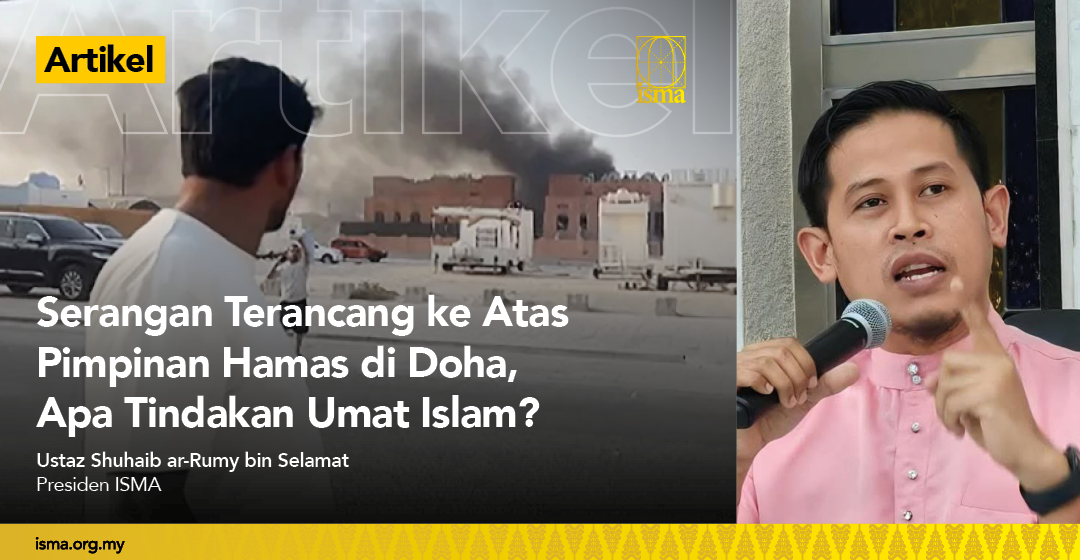
BACKGROUND OF THEOCRACY
Shafiqah Othman began her article in The Evils of Theocracy by defining theocracy, maybe simply by Google-ing the definition, she concluded that theocracy is a government in which God or a Higher Being is seen as the supreme ruler and government officials are regarded as divinely guided. And she continued her postulation that Malaysia is creeping into theocracy.
The word theocracy is a compound of theos (god) and kratia (rule), which means “rule by God or some god(s).” Usually it refers to some form of divine rule through some human agent or lieutenant.
Theocratic forms of government have existed throughout history. Theocracies were known among ancient people like in Egypt where the Pharaohs were considered as divine or semi divine figures. The Pharaohs were also regarded as representatives of God and even incarnated the deity. Remember the dialogue between Pharaoh and Moses in the Quran when Pharaoh said, “I am your God of High.”
European history tells a long and gruesome tale of religious wars and government oppression justified by states claiming to be enforcing divine law. The existence of belief like The Letter of Indulgence is an evidence suggesting the Roman Catholic Church was acting like God.
The concept of theocracy was also explained by a Jewish historian, Flavius Josephus (37 CE-c. 100 CE), which attempted to explain to the Gentiles (non-Jews) about the Jewish state and political system. It was an effort to express loyalty to the Roman Empire and at the same time to preserve his Jewish identity. Josephus explained that theocracy is different from other forms of government, such as monarchy, oligarchy and republics. Josephus said, “our legislator [Moses] had no regard to any of these forms, but he ordained our government to be what, by a strained expression, may be termed a theocracy [ theokratia ], by ascribing the authority and power to God, and by persuading all the people to have a regard to him, as the author of all good things” (Josephus 1737).
ISLAM AND THEOCRACY
It is erroneous if anyone has suggested that Islam and theocracy are consistent.
First, theocracy disregard humanity. Europe has experienced mankind under the authority of Church had been divided into castes and classes, high and low, noble and menials. These articles of faith had drawn such lines of demarcation between man and man that he could never hope to be united again.
The Roman Catholic Church had the same amount, if not more, power and wealth than the kings. The Catholic Church was based in Rome and headed by the Pope and was considered as infallible. The Pope had the power to remove kings from power. As a result of lack of integration, rivalry exist between people and God.
While Islam is nowhere near to theocracy since the purpose of the sharia is to provide for the fulfilment of humanity and its tendencies; to protect the weak from the strong; and to create an environment conducive to virtue and good conduct in the public sphere, while allowing un-impinged free agency within the private sphere. Islamic law rightly does not conceive the human nature as being individualist, but regards human beings as social creatures, imbued with free will, and created for a purpose higher than base, narcissistic self-interest.
Secondly, while theocracy suggested a God’s representative can act on His behalf and creatively comes out with new rulings and culture, Islam suggested no one can surpass Allah’s commands as per guided through His Words, i.e. the Al Quran and as per exemplified by His Prophet, i.e. the Sunnah.
There is a hadeeth recorded in Sunan At Tirmidhi that Harith ibn Amr reported:
Some men among the companions of Mu’adh said the Messenger of Allah, peace and blessings be upon him, sent him to Yemen and,
The Prophet said: “How will you judge?”
Mu’adh said, “I will judge according to what is in the Book of Allah.”
The Prophet said: “What if it is not in the Book of Allah?.”
Mu’adh said, “Then with the tradition (sunnah) of the Messenger of Allah.”
The Prophet said: “What if it is not in the tradition of the Messenger of Allah?”
Mu’adh said, “Then I will strive to form an opinion (ijtihad).”
The Prophet said: “All praise is due to Allah who has made suitable the messenger of the Messenger of Allah.”
In theocracy, the society and its leaders believe they have a divine right. This is different from Islam as portrayed in the conversation between Prophet Muhammad (saw) and Muadh (ra). There is no one can be above Al Quran and Sunnah, which are the main reference to the Islamic jurisprudence. Not even the Prophet Muhammad’s companions or the Muslim scholars can surpass their opinions above Al Quran and the Sunnah.
Muslim scholars perform “ijtihad” (rigorous legal reasoning) to extrapolate from those sources more detailed guidance for life according to shariah. This guidance comes in the form of detailed legal rules called “fiqh” (literally “understanding”). Muslims never established any clerical establishment or central institution to establish Islam’s official religious doctrine, so the religious rules of Islam are the result of the work of a diverse community of fiqh scholars operating according to their own collective standards of integrity and professionalism, within the boundary of Al Quran and Sunnah.
MALAYSIA AND ITS ISLAMIC CONSTITUTIONALISM
We must understand that Islam is not a religion that is limited to personal worship and moral conduct. Islam is a way of life, which integrates all aspects of human being’s life to be under full submission to Allah; be it governance and statehood, laws and jurisprudence, knowledge and wisdom, leadership and subordinates, material and technology, livelihood and productivity, wealth and charity, safety and security, and et cetera. The literal meaning of sharia is “way” or “street”, i.e. the way God advises people to live a virtuous life.
As Abul A’ala Al Maududi said, “There can be no doubt that Islam is not just a mere collection of dogmas and rituals but it is a complete way of life covering all fields of human activities, may they be private or public, legal, political, economic, social, cultural, moral or judicial…”
Hence it is incorrect to suggest that governance and jurisprudence are independent from Islam to the extend we have to result ourselves to man-made law.
Malaysia is not a secular country as concluded by Shafiqah Othman, but indeed there are provisions on Islam in the Federal Constitution. Malaysia as a country that practiced Islamic Constitutionalism is not suggested just yesterday, but it was there since the Malacca Sultanate era. She said,
“While I am perfectly aware that constitutionally, Malaysia is a secular country, it makes me uncomfortable to see the attempts certain elitists have made to slowly turn our beloved country into a theocracy. They started by demonising the terms “secularism” and “pluralism”; two ideas that promote the harmonious co-existence of different faiths and beliefs.”
Quoting from Dato’ Prof. Hj Mahamad Naser bin Disa, CEO of IKSIM,
“… it is encouraging to note that the Federal Constitution imposed an obligation upon the Supreme Head of Federation – The Yang Dipertuan Agong to protect the religion of Islam. The 4th Schedule to Article 37(1) of Federal Constitution, expressly mention the obligation of His Majesty in his Oath of the Office to protect the religion of Islam at all time.
Without this special or exclusive position in the Federal Constitution, there wouldn’t be this kind of assurance in favour of Islam by the Supreme Head of Federation who is also obliged to perform his obligation in ruling the country justly according to the laws. Is a secular state bears al this religious obligation?
The cardinal principle of Islam as the religion of Federation would not be perceived correctly by reading separately the Article 3(1) from other provision of the Federal Constitution. This principle would be appreciated by a comprehensive analysis to Article 11(4), Article 12(2), Article 121 (1A), item 1 of State Lists of the 9th Schedule to the Federal Constitution and most important – the oath of His Majesty in 4th Schedule.
It is a well-established principle in Malaysian judicial system that the Federal Constitution should be read and interpreted broadly to ensure that all provisions are interrelated to one another. It means that each provision in the Federal Constitution shall not be read separately. If this occurred, it will negate and deny the ultimate goal of having such constitution. (Danaharta Urus Sdn. Bhd. V. Kekatong Sdn. Bhd.(Bar Council Malaysia, Intervener) .”
MALAYSIA AND THEOCRACY
Shafiqah Othman somehow did not provide any evidence to her claim that Malaysia is creeping into theocracy. She also claimed that this country has become anti-secular and anti-pluralism.
In reality the liberal camps who are becoming more aggressive and intolerance towards the nation’s identity with regards to the positions of Islam, Malays and the Sultanates.
COMANGO for instance, surpassing the opinion of Malaysians, went straight to Geneva for Universal Periodic Review (UPR) and demanded “rights” without seeking the approval of majority of the Malaysians. Amongst the requests are, seeking rights for Muslims to detach themselves from the Sharia Court and enforcement of the Islamic authorities and giving more rights to LGBTQ to the extent of endorsing sex change and same sex marriage.
Muslim reverts who were under threats from their families and communities, barely got Shafiqah Othman’s attention. And where is she when the Muslims were aggravated by the request from the Christians to equate Allah with other deities, i.e. Jesus and Holy Ghost? And when Zakir Naik was accused guilty of terrorism without proof, has she tried calming the whole non-Muslim community to wait for fair trial?
Shafiqah Othman is just one type of Muslim who is obsessed with her image in front of the liberals and disbelievers. She loves the Muslims who present the ‘good girl’ image to them and she despises the Muslims who tried to conform to the real Islam. She has no essence to speak about Islam, but she will try as much to defend secularism, a failed idea of which even the West are trying to escaped from now.
Norhidayah Ismail
Wanita ISMA Activist


